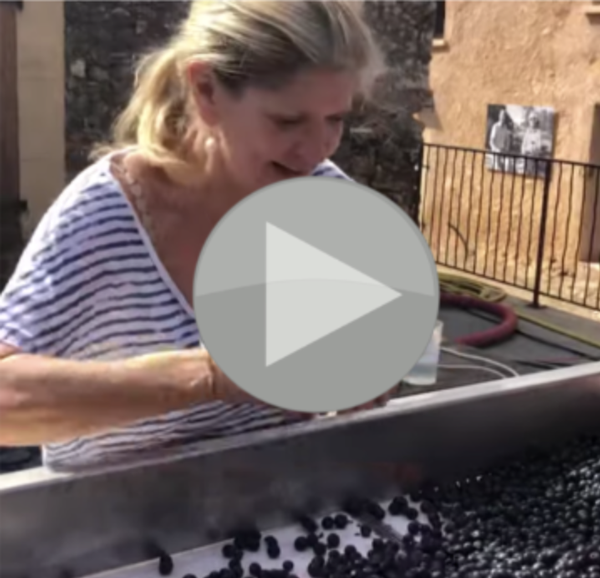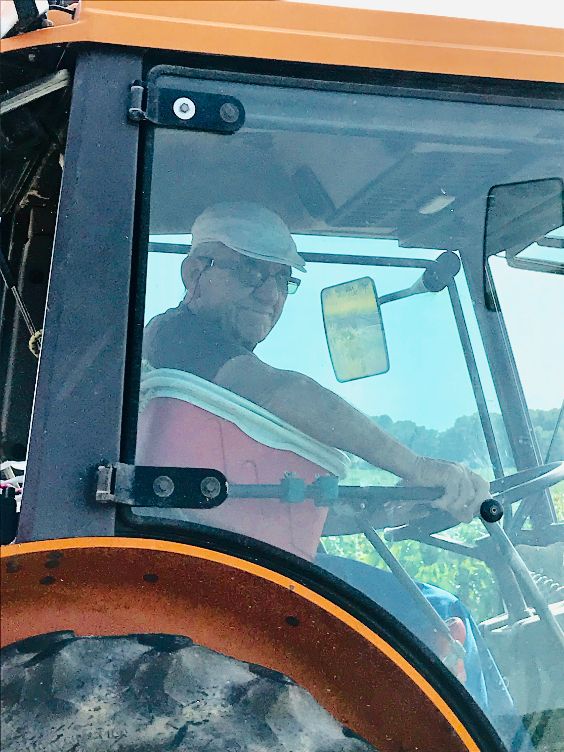BLOG
Harvest in the Languedoc - a hands on experience!
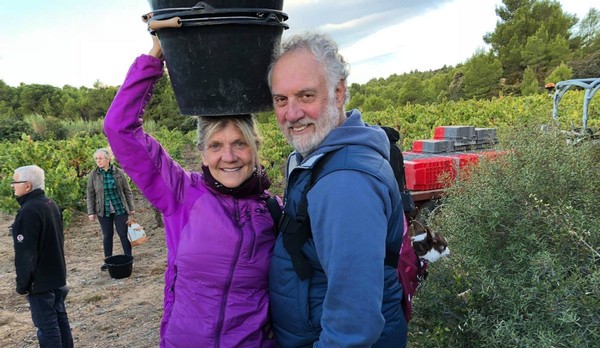
The Languedoc-Roussillon is buzzing like a beehive! Everywhere you look, day and night, people are in the vineyards harvesting grapes, both by hand and machine.
It’s an honor to witness and support this tradition which has existed in the Languedoc-Roussillon for over 2,000 years. We feel blessed!
The small-scale, independent winemakers whose wines we sell harvest almost exclusively by hand.
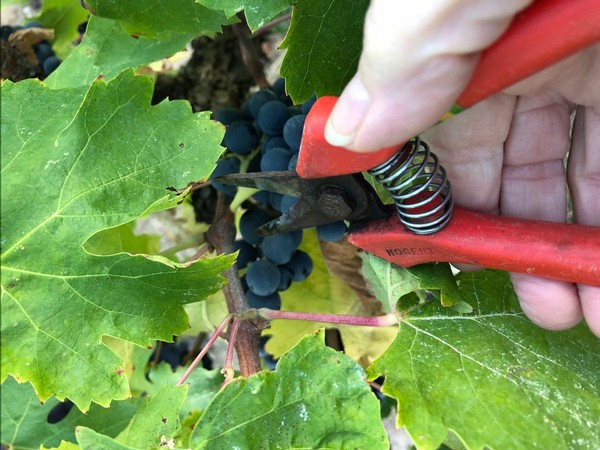
A great deal of care goes into hand-harvesting grapes.
Hand-harvesting means the grapes arrive at the winemaking cave intact, without the skins having been broken, so there is no oxidation of the juice prior to fermentation. When our winemakers use machines, they generally harvest at night when the grapes are cool. This ensures maximum freshness until the grapes begin fermentation in the tanks. Fresh grapes = delicious wines!!
The brief video below details why destemming grapes before vinification matters!
What happens once the grapes are harvested? It depends on the grower and how the wine will be vinified and sold.
In broad terms, there are three kinds of wine sellers in this region: independent winemakers, large-volume producers and/or sellers called negotiants, and caves cooperatives which serve very small growers.
The independent winemakers are the small producers about whom we are wildly enthusiastic. Our wines are made at the domaine or chateau where the grapes are grown. The people who planted the vines also care for the soil, prune the vines, harvest the grapes, make the wines and bottle the wines with their own labels. That is why we call our wines “root to sip."
Both negotiants and caves cooperatives play important roles in Languedoc-Roussillon winemaking. While the negotiants might grow some of their own grapes, in general, they buy grapes, and sometimes wine, from others. Then they bottle and sell under their own label.
The caves cooperatives provide a much-needed service to small growers who don't have enough grapes or financial resources to produce their own wines. Each cooperative has its own winemaker and winemaking facility. These facilities were built in the 1930s and 40s and are often absolutely beautiful.
The below photo shows a small plot winegrower just returning from the cave cooperative in Cruzy, a village next to ours. You'll see similar sights everywhere during the harvest, with small tractors buzzing about from the wee hours of the morning to very late at night.
By supporting small growers, the cooperatives keep the region alive and flourishing. They're a big part of why the Languedoc-Roussillon is so spectacular. However, because the grapes are cultivated in many different soils under widely varying horticultural practices, the cooperative wines lack the distinctive terroir we so love in the independent winemakers whose wines we sell.
We did, however, discover a delicious Fitou appellation, Cascastel, that we couldn’t resist! In fact, this cooperative wine received the gold medal just a few weeks after we chose it!
Our lucky wine club members will get the first taste of Cascastel in the next club shipment. After that, we'll add it to our online Wine Shop so everyone can enjoy!
Featured Wine
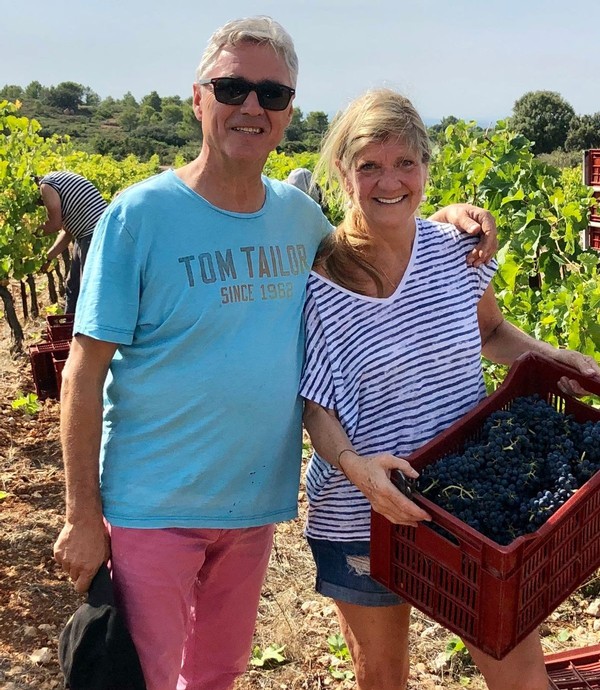
Carol (The Princess) with a carton of hand-harvested Syrah grapes, standing next to Philippe Gaillard of Château Gilbert & Gaillard.
Château Gilbert & Gaillard's brilliant young winemaker is Marine Faugier. She also happens to be our neighbor!
Below you'll find one of her wines, a delicious rosé.
Domaine Gilbert & Gaillard 2018 le Rosé
85% Mourvèdre, 15% Grenache
Mourvedre is the KING grape for rosé and imbues this wine with a lovely flavor.
Serve this super drinkable and flirtatious rosé with roasted turkey sandwiches, curried mayonnaise, and slices of vine-ripened tomatoes.
Life is good!
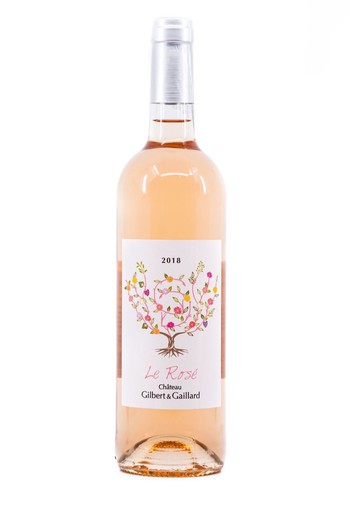

Do Wines Really Need to Breathe?
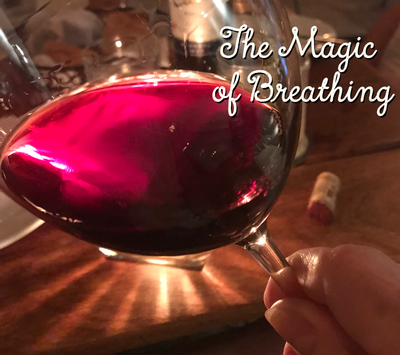
People often ask if it's necessary to open wines before drinking so they can "breathe." And how long will the wine last after it’s been opened? We have answers!
Allowing a wine to breathe simply means exposing the wine to oxygen. So just opening the bottle won’t help because the neck of the wine bottle is too narrow.
The wine must be "decanted," or poured into a vessel with a broad base, so the surface of the wine is exposed to oxygen. Now the magic of breathing begins!
One of our favorite pastimes is searching the brocante (flea markets) for old crystal decanters. These unique and inexpensive (€5 or so) vessels work perfectly. But you may decide you’d like to buy a beautiful traditional decanter.
All of our Languedoc-Roussillon red wines benefit from decanting. Generally, the longer a wine will keep in the cellar, the 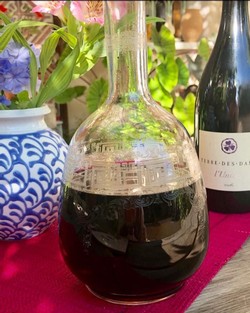 longer the decanting time should be when the wine is young. For example, a two-year-old wine that you have been advised will drink perfectly in ten years should be decanted at least two hours before enjoying. But when that same wine is close to ten years old, decanting for 30 minutes to one hour should be enough.
longer the decanting time should be when the wine is young. For example, a two-year-old wine that you have been advised will drink perfectly in ten years should be decanted at least two hours before enjoying. But when that same wine is close to ten years old, decanting for 30 minutes to one hour should be enough.
Another general rule: wines made from Mediterranean red grape varieties benefit the most from decanting because the blends contain enough tannins and phenolic compounds to give the wine a long life. These include Syrah, Grenache, Carignan, Mourvèdre and Cinsault.
We test wines every week to see how long we still love them after we open them. Best not to decant the whole bottle if you’re not going to drink it all. Instead, pour a glass or two of wine an hour before serving. Then, "aspirate" the bottle (remove the air) with a vacuum pump such as a VacuVin Wine Saver and store for later.
We like to aspirate our bottles then refrigerate. Most red wines will keep for two to three days, but we've had several drink really well after a week!
If you decant the full bottle, you can also pour any remaining wine back and aspirate. The wine will likely be best within 24 hours. Experiment for yourself!
